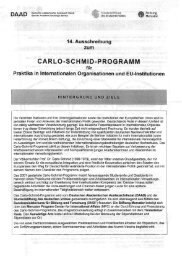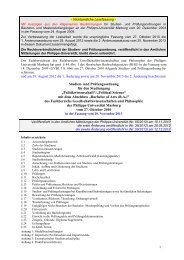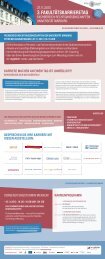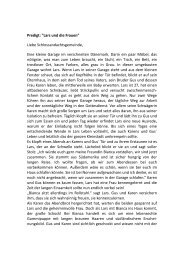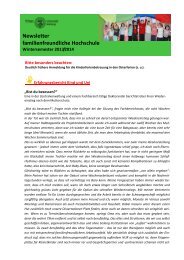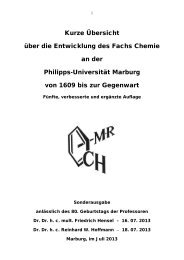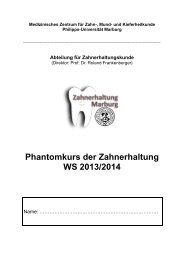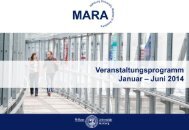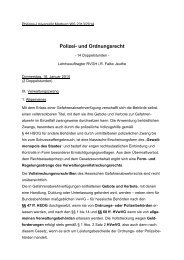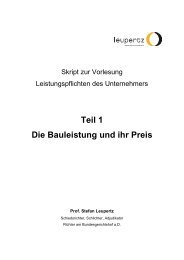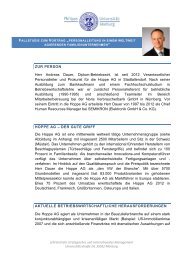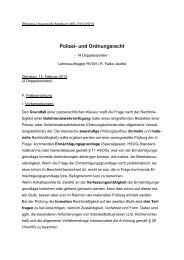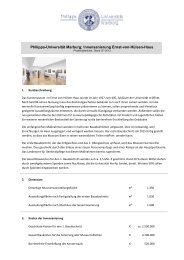Promoting The English Theatre Frankfurt
Promoting The English Theatre Frankfurt
Promoting The English Theatre Frankfurt
Create successful ePaper yourself
Turn your PDF publications into a flip-book with our unique Google optimized e-Paper software.
University of Marburg<br />
Department of <strong>English</strong> and American Studies<br />
Winter Term 2012/2013<br />
Course: UE Techniques of Scientific Work<br />
Instructor: Imke Kimpel, M.A.<br />
Portfolio<br />
<strong>Promoting</strong> <strong>The</strong> <strong>English</strong> <strong>The</strong>atre <strong>Frankfurt</strong><br />
<strong>The</strong> <strong>English</strong> <strong>The</strong>atre Group<br />
Group Members: Jonas Engeland, Julia Elisa Sahm, Liza Scherer, Christina Schuster<br />
Partner Organization: <strong>The</strong> <strong>English</strong> <strong>The</strong>atre <strong>Frankfurt</strong><br />
Date of Submission: 25 March 2013
Contents<br />
PART I: OUR PROMOTION CAMPAIGN FOR THE ENGLISH THEATRE FRANKFURT<br />
1. Initial Project Proposal .................................................................................................................... 2<br />
2. Email Correspondence with Juliane Moschell .............................................................................. 9<br />
3. Our Thoughts about the Changes .............................................................................................. 10<br />
4. Revised Project Proposal .............................................................................................................. 11<br />
5. PR Workshop ............................................................................................................................... 20<br />
PART II: ADDITIONAL TASKS FOR UNIVERSITY<br />
6. <strong>The</strong> Newspaper Article ................................................................................................................ 22<br />
6.1 Preparing the Article (Extracts from Learning Diary Entries) ...................................................... 22<br />
6.2 <strong>The</strong> Final Version: “Sweet Charity” Newspaper Article ............................................................... 23<br />
7. Minutes ........................................................................................................................................ 25<br />
8. Interview ...................................................................................................................................... 26<br />
8.1 Preparing the Interview (Extracts from Learning Diary Entries) ................................................. 26<br />
8.2 <strong>The</strong> Written Version of Our Interview........................................................................................ 27<br />
9. Interview Questions for the Humanities Group .......................................................................... 32<br />
10. Some Words about the Promotion Concept .......................................................................... 33<br />
11. Some Words about the Final Presentation .............................................................................. 34<br />
12. Thoughts about Our Group Work .......................................................................................... 35<br />
13. Short Conclusion ...................................................................................................................... 37<br />
14. Appendix .................................................................................................................................. 38
<strong>The</strong> <strong>English</strong> <strong>The</strong>atre Group 1<br />
PART I:<br />
OUR PROMOTION CAMPAIGN FOR THE ENGLISH THEATRE<br />
FRANKFURT
<strong>The</strong> <strong>English</strong> <strong>The</strong>atre Group 2<br />
1. Initial Project Proposal<br />
ABSTRACT<br />
Statistical data suggest that the proportion of young people in the audiences of theatres is<br />
relatively low in comparison with other areas of cultural life such as cinemas (“Der<br />
Kinobesucher 2011” 7;16; “<strong>The</strong>aterstatistik 2010/2011” 259). <strong>The</strong>refore, our individual<br />
objectives include reacting to the lack of interest in and information about <strong>English</strong> theatre<br />
in general. To be precise, we aim at drawing attention to our partner organization, <strong>The</strong><br />
<strong>English</strong> <strong>The</strong>atre in <strong>Frankfurt</strong> and its offers. Moreover, we would like to demonstrate that this<br />
venue provides an opportunity for cultural exchange and awareness. Our plan is to create<br />
and distribute flyers, posters and a brochure with information for teachers and instructors.<br />
We would also like to give presentations at secondary schools and universities in Marburg<br />
and Giessen. Furthermore, we would like to promote <strong>The</strong> <strong>English</strong> <strong>The</strong>atre with the help of<br />
social media like Facebook and Twitter. All our activities will be implemented in consultation<br />
with <strong>The</strong> <strong>English</strong> <strong>The</strong>atre in <strong>Frankfurt</strong>. <strong>The</strong> overall goal of these activities is to increase the<br />
number of young people in the audience. Our budget of 103,15 euro net, 122,75 euro<br />
gross, will be provided by our partner organization.<br />
CONTEXT<br />
In 2011, there were 126 million cinema attendances in Germany (“Der Kinobesucher 2011”<br />
7). 23 per cent of the audience were in the 10 to 19 age bracket, 26 per cent in the 20 to<br />
29 age bracket (“Der Kinobesucher 2011” 16). Thus, almost half of the cinema audience, 49<br />
per cent, were between 10 and 29 years old.<br />
In contrast to that, there were about 19 million visits to theatres in Germany during the<br />
season 2010/2011 (“<strong>The</strong>aterstatistik 2010/2011” 259). Tickets for pupils, students, children<br />
and adolescents constituted about 16 per cent of this total number (“<strong>The</strong>aterstatistik<br />
2010/2011” 259). This shows that cinemas outnumber theatres considerably as concerns<br />
the total number of sold tickets and the proportion of young members in the audience.<br />
Notably, these statistics suggest that drama should be promoted more. We assume that<br />
the relatively small figures in theatres are due to a lack of interest and information.<br />
<strong>The</strong>refore, we would like to advertise drama in local educational institutions in order to<br />
react to the imbalance described above.
<strong>The</strong> <strong>English</strong> <strong>The</strong>atre Group 3<br />
PROJECT JUSTIFICATION<br />
<strong>The</strong> paragraph above already points out that the number of young people who are<br />
interested in <strong>English</strong> drama and theatre is not very high. We have found that in the age of<br />
3D-cinema and blu-ray, most students prefer the convenient way of watching a film or play<br />
at the local cinema or even online at home, instead of visiting a theatre. We asked<br />
ourselves why it is like that and why today’s society prefers digitalized entertainment even if<br />
spectators can have real people acting for them. Has theatre become too old fashioned for<br />
the highly developed and fastidious society of the 21 st century?<br />
It cannot only be a matter of convenience, as there is no difference between getting to<br />
the local cinema to getting to the local theatre. Neither can it be a matter of content as<br />
there are theatre plays that cover all kinds of genres. Moreover, the <strong>English</strong> language<br />
cannot be a reason for young people not to visit a theatre, as nowadays <strong>English</strong> can be<br />
found everywhere and often even is preferred to German in music or films. <strong>The</strong> only thing<br />
we could think of is that the form of theatre in general is very different from cinema and<br />
therefore could be deterrent. But except for the fact that the issue of liking or not liking<br />
theatre in general is a matter of taste, we came up with the conclusion that there is no<br />
reason for young people to prefer cinema to theatre. So, what is it that prevents young<br />
people from visiting a theatre play?<br />
Thanks to some research and contact with students, we came up with an answer.<br />
<strong>The</strong>atre is not enough promoted, or, strictly speaking, the advantages of theatre are not<br />
emphasized and highlighted enough among young people. <strong>The</strong>re are advertisements for<br />
new films everywhere and all the time, but only very few eye-catching ones for upcoming<br />
theatre plays. <strong>The</strong>refore, we decided to do our project on this issue and to promote <strong>English</strong><br />
<strong>The</strong>atre in the area around Giessen and Marburg. We want to attract more young people<br />
to <strong>English</strong> theatre in general and inform them about <strong>The</strong> <strong>English</strong> <strong>The</strong>atre in <strong>Frankfurt</strong>.<br />
Furthermore, we would like to bring the advantages of <strong>English</strong> theatre closer to them and<br />
raise their interest in the <strong>English</strong> language, as well as increasing their intercultural<br />
awareness. We would also like to put across that <strong>English</strong> <strong>The</strong>atre is entertaining, too. That is<br />
why we have designed our campaign to attract especially young people and to show<br />
them how rewarding theatre can be.
<strong>The</strong> <strong>English</strong> <strong>The</strong>atre Group 4<br />
PROJECT AIMS/PURPOSE<br />
<strong>The</strong> ideal outcome of our project can be divided into an overall and main objective, three<br />
individual project objectives and three project results. Our main objective, which is on top<br />
of the hierarchy, is to increase the number of young members (aged 12 to 30 years) in the<br />
audience of <strong>The</strong> <strong>English</strong> <strong>The</strong>atre in <strong>Frankfurt</strong>. In particular, we want to achieve that pupils<br />
and students from Marburg and Giessen will visit <strong>The</strong> <strong>English</strong> <strong>The</strong>atre more frequently - be<br />
it with a school class, a university course or on their own. To achieve this main goal, our<br />
three individual project goals have to be reached first.<br />
One of our individual goals is to promote <strong>English</strong> drama, as this will encourage pupils<br />
and students to go to the theatre in the first place. <strong>The</strong>n, we have to assure that our target<br />
group will consider visiting <strong>The</strong> <strong>English</strong> <strong>The</strong>atre in <strong>Frankfurt</strong>, which is why our second<br />
individual goal is to promote this particular theatre. Although these are the main factors<br />
that will lead to the achievement of our main goal, we have one further individual goal -<br />
namely that of promoting <strong>The</strong> <strong>English</strong> <strong>The</strong>atre as a platform for cultural exchange and<br />
awareness - because we feel that this is of educational and cultural importance and<br />
because it could be a reason for teachers and instructors to encourage their students to go<br />
to <strong>The</strong> <strong>English</strong> <strong>The</strong>atre. Again, this would result in an increased number of young people in<br />
the audience of <strong>The</strong> <strong>English</strong> <strong>The</strong>atre.<br />
<strong>The</strong> basis of our project hierarchy is formed by our project results, which have to be<br />
reached to achieve our individual goals. In order to promote <strong>English</strong> drama, our first result<br />
has to be an increased interest in it. Our second result is the spread of knowledge about<br />
<strong>The</strong> <strong>English</strong> <strong>The</strong>atre in <strong>Frankfurt</strong>, which will help to achieve our second individual goal - the<br />
promotion of <strong>The</strong> <strong>English</strong> <strong>The</strong>atre. Lastly, our objective to promote <strong>The</strong> <strong>English</strong> <strong>The</strong>atre as a<br />
platform for cultural exchange requires that one of our results is to raise cultural interest<br />
and awareness. <strong>The</strong>se results complete our hierarchy that is topped by our overall project<br />
goal, which is followed by our individual objectives.
<strong>The</strong> <strong>English</strong> <strong>The</strong>atre Group 5<br />
DEFINITION OF THE TARGET GROUP/AUDIENCE<br />
As already described, our target group are young people from Marburg and Giessen who<br />
are aged between 12 and 30 years and who have sufficient <strong>English</strong> skills to be able to<br />
understand a play in <strong>English</strong>. As <strong>The</strong> <strong>English</strong> <strong>The</strong>atre in <strong>Frankfurt</strong> often presents plays<br />
whose dialogues have been adapted especially for students, a low intermediate learning<br />
status is sufficient. Thus, our target group is defined by age and <strong>English</strong> skills rather than by<br />
ethnicity, social class or gender.<br />
One further factor that limits our target group is that we will concentrate on students<br />
who either attend a public secondary school in Marburg or Giessen or are enrolled at one<br />
of the universities in these towns. In particular, our project will address students from the<br />
University of Marburg and the University of Giessen as well as pupils from the following<br />
schools: Elisabethschule Marburg, Martin-Luther-Schule Marburg, Gymnasium Philippinum<br />
Marburg, Landgraf-Ludwigs-Gymnasium Giessen, Liebigschule Giessen and Herderschule<br />
Giessen. This limitation was necessary because we do not have a sufficient budget to<br />
address a wider audience.<br />
Still, the limitation also makes sense because pupils and students will probably profit the<br />
most from visiting <strong>The</strong> <strong>English</strong> <strong>The</strong>atre in <strong>Frankfurt</strong>, as it has several offers for this group. For<br />
example, the theatre presents plays whose topics are particularly interesting for and<br />
relevant to young people, and the language is adapted accordingly. What is more, theatre<br />
pedagogues and language teachers are employed at <strong>The</strong> <strong>English</strong> <strong>The</strong>atre to provide<br />
teachers with tuition material and to offer workshops in which students cannot only<br />
practise their language skills but also get to know the theatre and actors and actresses from<br />
<strong>English</strong>-speaking countries (cf. Gonszar). Thus, <strong>The</strong> <strong>English</strong> <strong>The</strong>atre is an ideal place for<br />
language learning and cultural exchange. For pupils, visiting <strong>The</strong> <strong>English</strong> <strong>The</strong>atre will be an<br />
exciting and enriching experience and a nice change from their daily routine at school.<br />
Likewise, university students can profit from visiting <strong>The</strong> <strong>English</strong> <strong>The</strong>atre. While the plays<br />
with an adapted language are a great opportunity for students with less advanced <strong>English</strong><br />
skills to see <strong>English</strong> drama in the original language, students with advanced <strong>English</strong> skills<br />
can also attend regular performances and enjoy the original, modern and international<br />
plays with an internationally renowned cast. <strong>The</strong>refore, <strong>The</strong> <strong>English</strong> <strong>The</strong>atre is also a great<br />
place to visit for students.
<strong>The</strong> <strong>English</strong> <strong>The</strong>atre Group 6<br />
PROJECT IMPLEMENTATION<br />
Our planned activities are as follows:<br />
(1) Creating and Distributing Flyers and Posters<br />
(2) Creating and Distributing a Brochure for Teachers and Instructors<br />
(3) Presentations at Local Schools and Universities<br />
(4) Promotion via Social Media (Facebook and Twitter)<br />
Notably, all of these activities aim at promoting <strong>English</strong> drama and <strong>The</strong> <strong>English</strong> <strong>The</strong>atre in<br />
<strong>Frankfurt</strong>, which is how we plan to achieve our overall goal. We will start by creating flyers<br />
and posters which will include information about a play that is about to have premiere at<br />
<strong>The</strong> <strong>English</strong> <strong>The</strong>atre and that is particularly appealing to young people. We may also<br />
include some reasons as to why it is a great idea for pupils and students to attend a<br />
performance of this play at <strong>The</strong> <strong>English</strong> <strong>The</strong>atre. <strong>The</strong> flyers will be distributed by us at the<br />
universities and schools previously mentioned, and the posters will also be attached there.<br />
We will also create a brochure for teachers and instructors that will include information<br />
about <strong>The</strong> <strong>English</strong> <strong>The</strong>atre‘s special offers for young people as well as reasons for why<br />
teachers and instructors should encourage their students to visit <strong>The</strong> <strong>English</strong> <strong>The</strong>atre. This<br />
brochure will be given by us to <strong>English</strong> teachers and foreign language instructors at our<br />
target schools and universities. As some pupils and students may not be convinced by their<br />
teachers and instructors, we will also give some presentations ourselves to show them that<br />
we as fellow young people can also only recommend <strong>The</strong> <strong>English</strong> <strong>The</strong>atre.<br />
Lastly, we would like to make use of Facebook and Twitter, as these formats are very<br />
appealing to young people. In particular, we would like to create a Twitter account as well<br />
as a Facebook page for the play that is about to start in order to keep our followers up-todate.<br />
Links to the corresponding Facebook and Twitter page will be given on our flyers and<br />
posters. All of these activities will be talked through with Juliane Moschell from <strong>The</strong> <strong>English</strong><br />
<strong>The</strong>atre, who may provide us with some relevant material.<br />
For our activities, the following resources will be needed:<br />
(1) Flyers, shiny, double-sided illustration printing paper, 135 g, A6 format, 2500 pieces,<br />
41,10 euro net, 48,91euro gross<br />
(2) Posters, shiny, printing paper, 135 g, A3 format, coloured print, 50 pieces, 24,67 euro
<strong>The</strong> <strong>English</strong> <strong>The</strong>atre Group 7<br />
net, 29,36 euro gross<br />
(3) Brochures, shiny, double-sided illustration printing paper, 135 g, long format (19,8 cm x<br />
21 cm), upright, four-pages, 100 pieces, 37,38 euro net, 44,48 euro gross<br />
As already mentioned in the activity plan, we will create and distribute flyers, posters and<br />
brochures. <strong>The</strong> quantity of our promotion material is estimated with regard to the different<br />
locations where we want to spread them, namely two universities and six schools which<br />
are listed above. <strong>The</strong> total costs for this material will be 103,15 euro net, 122,75 euro gross,<br />
shipping costs already included (according to the order at flyeralarm.com). <strong>The</strong>re will be no<br />
travel costs for us because our student ticket includes the locations in Giessen and Marburg<br />
which can be reached by public trains and busses. We do not have any additional costs for<br />
upcoming phone calls and internet usage due to the fact that each group member has<br />
internet access and a phone with a flat rate. All in all, our estimated total project costs add<br />
up to 103,15 euro net, 122,75 euro gross.<br />
BUDGET<br />
Our direct costs consist of the expenses for our promotion material listed in our resource<br />
plan, namely 103,15 euro net, 122,75 euro gross. This will be covered by <strong>The</strong> <strong>English</strong><br />
<strong>The</strong>atre. Additionally, there will not be any operational costs for our project because we will<br />
implement our planned activities personally and in cooperation with <strong>The</strong> <strong>English</strong> <strong>The</strong>atre<br />
<strong>Frankfurt</strong>.<br />
MANAGEMENT AND PERSONNEL<br />
Personally, we are all interested in the field of public relations and <strong>English</strong> theatre, and our<br />
future jobs are very likely to be in this area. Since our degree covers among others, the<br />
fields of literature, media and <strong>English</strong> language and culture, we are experts in various fields<br />
and are provided with several hard and soft skills (language skills, computer skills, numeric<br />
skills, communication skills, intercultural competence, time management, self-awareness,<br />
etc.) that provide us with the skills that are needed in the field of public relations and/or<br />
<strong>English</strong> theatre. So, due to the fact that <strong>English</strong> theatre and the field public relations offer<br />
job and career possibilities to us as students of the humanities, we are especially motivated<br />
and stand very much behind our project.
<strong>The</strong> <strong>English</strong> <strong>The</strong>atre Group 8<br />
As concerns our distribution of roles, all of our group members will be involved in the<br />
creation and distribution of the flyers, posters and the brochure for teachers. More<br />
specifically, Jonas will be responsible for design and layout, while Julia and Liza will take<br />
care of the content (texts). Christina will then order this promotion material. All of us will<br />
distribute the material. While Jonas and Christina will distribute it in Marburg, Liza and Julia<br />
will do so in Giessen.<br />
When it comes to social media, Christina will be mainly responsible for Facebook and<br />
Julia for Twitter. Again, Jonas will take care of design and layout, while Julia and Liza will<br />
supervise content and texts. Lastly, Liza will be the contact person for Juliane Moschell from<br />
<strong>The</strong> <strong>English</strong> <strong>The</strong>atre and will coordinate all our actions with her.<br />
BIBLIOGRAPHY<br />
“Der Kinobesucher 2011.” ffa.de. Filmförderungsanstalt German Federal Film Board, May<br />
2012. Web. 04 Nov. 2012.<br />
Gonszar, Michael. “Education.” <strong>English</strong> <strong>The</strong>atre <strong>Frankfurt</strong>. <strong>English</strong> <strong>The</strong>atre <strong>Frankfurt</strong>, n.d.<br />
Web. 03 Nov. 2012.<br />
“<strong>The</strong>aterstatistik 2010/2011 Summentabellen.” buehnenverein.de. Deutscher Bühnenverein,<br />
2012. Web. 02 Nov. 2012.
<strong>The</strong> <strong>English</strong> <strong>The</strong>atre Group 10<br />
3. Our Thoughts about the Changes<br />
Of course, we were a bit disappointed at first that we had to change almost all of our<br />
activities. However, we also really liked the idea of working with social media and helping<br />
to promote a flash mob. <strong>The</strong>refore, our disappointment quickly faded away, and we were<br />
looking forward to our new challenges.<br />
None of us had ever used social media for professional purposes before, which meant<br />
that we had to do a lot of research about this matter and also about legal issues that may<br />
arise when using social media in a professional context . Thus, we really learnt a lot –<br />
probably a lot more than we would have learnt with our initial activities. For this reason, we<br />
are now very glad about the changes.
<strong>The</strong> <strong>English</strong> <strong>The</strong>atre Group 11<br />
4. Revised Project Proposal<br />
ABSTRACT<br />
Statistical data suggest that the proportion of young people in the audiences of theatres is<br />
relatively low in comparison with other areas of cultural life such as cinemas (“Der<br />
Kinobesucher 2011” 7;16; “<strong>The</strong>aterstatistik 2010/2011” 259). We assume that the relatively<br />
small figures in theatres are due to a lack of information, which is why we want to use new<br />
means of promotion, such as social media and online forums, that are appealing to an<br />
increasingly great (and predominately young) audience to spread knowledge about <strong>The</strong><br />
<strong>English</strong> <strong>The</strong>atre. Our aims are to raise awareness of <strong>The</strong> <strong>English</strong> <strong>The</strong>atre’s Facebook page<br />
and to make it more appealing and interesting in order to acquire new and loyal Facebook<br />
friends that can be directly informed about new plays and special offers. <strong>The</strong>se aims are<br />
necessary in order to reach our overall goal, which is to expand <strong>The</strong> <strong>English</strong> <strong>The</strong>atre’s<br />
potential audience. Further, we want to use social media and online forums to promote<br />
special events for <strong>The</strong> <strong>English</strong> <strong>The</strong>atre, as this is an efficient and low cost means of<br />
promotion that is not properly used yet by <strong>The</strong> <strong>English</strong> <strong>The</strong>atre.<br />
All our activities will be implemented in consultation with Juliane Moschell from <strong>The</strong> <strong>English</strong><br />
<strong>The</strong>atre, and our budget of 130,00 euro that was provided by the Career Center will be<br />
spent on Facebook advertising.<br />
CONTEXT<br />
In 2011, there were 126 million cinema attendances in Germany (“Der Kinobesucher 2011”<br />
7). 23 per cent of the audience were in the 10 to 19 age group, 26 per cent in the 20 to 29<br />
age group (“Der Kinobesucher 2011” 16). Thus, almost half of the cinema audience, 49 per<br />
cent, were between 10 and 29 years old.<br />
In contrast to that, there were about 19 million visits to theatres in Germany during the<br />
season 2010/2011 (“<strong>The</strong>aterstatistik 2010/2011” 259). Tickets for pupils, students, children<br />
and adolescents constituted about 16 per cent of this total number (“<strong>The</strong>aterstatistik<br />
2010/2011” 259). This shows that cinemas outnumber theatres considerably as concerns<br />
the total number of sold tickets and the proportion of young members in the audience.<br />
Notably, these statistics suggest that theatre plays should be promoted more. We<br />
assume that the relatively small figures in theatres are due to a lack of interest and<br />
information. <strong>The</strong>refore, we would like to advertise theatre plays in social media in order to<br />
react to the imbalance described above. We think that social networks and online forums<br />
can serve as an important tool for promotion since they are visited frequently and especially
<strong>The</strong> <strong>English</strong> <strong>The</strong>atre Group 12<br />
by the younger generation. Furthermore, <strong>The</strong> <strong>English</strong> <strong>The</strong>atre’s use of social media needs<br />
to be enhanced.<br />
PROJECT JUSTIFICATION<br />
<strong>The</strong> paragraph above already points out that the number of young people who are<br />
interested in <strong>English</strong> drama and theatre is not very high. We have found that in the age of<br />
3D-cinema and blu-ray, most students prefer the convenient way of watching a film or play<br />
at the local cinema or even online at home, instead of visiting a theatre. We asked<br />
ourselves why it is like that and why today’s society prefers digitalized entertainment even if<br />
spectators can have real people acting for them. Has theatre become too old fashioned for<br />
the highly developed and fastidious society of the 21st century?<br />
It cannot only be a matter of convenience, as there is no difference between getting to<br />
the local cinema to getting to the local theatre. Neither can it be a matter of content as<br />
there are theatre plays that cover all kinds of genres. Moreover, the <strong>English</strong> language<br />
cannot be a reason for young people not to visit a theatre, as nowadays <strong>English</strong> can be<br />
found everywhere and often even is preferred to German in music or films. <strong>The</strong> only<br />
difference we could think of is the form of theatre. For some people this may be deterrent.<br />
But except for the fact that the issue of liking or not liking theatre in general is a matter of<br />
taste, we came up with the conclusion that there is no such reason for young people to<br />
prefer cinema to theatre. So, what is it that prevents young people from visiting a theatre<br />
play?<br />
Thanks to some research and contact with students, we came up with an answer.<br />
<strong>The</strong>atre is not enough promoted, or, strictly speaking, the advantages of theatre are not<br />
emphasized and highlighted enough among young people. <strong>The</strong>re are advertisements for<br />
new films everywhere and all the time, but only very few eye-catching ones for upcoming<br />
theatre plays. <strong>The</strong>refore, we decided to do our project on this issue and to use new means<br />
of promotion to promote <strong>The</strong> <strong>English</strong> <strong>The</strong>atre <strong>Frankfurt</strong>.<br />
In particular, we want to work with social media and mainly Facebook, as we see social<br />
media becoming more and more important in the future. Furthermore, this is a very<br />
effective and convenient way to reach a large and especially young audience. Another<br />
reason for us to concentrate on social media is that <strong>The</strong> <strong>English</strong> <strong>The</strong>atre has not been using<br />
them very much so far, which means that we can expand their promotion concept with<br />
our project.<br />
We feel that our project can bring the advantages of <strong>English</strong> theatre closer to the<br />
younger generation, who can practise their <strong>English</strong> language comprehension skills and
<strong>The</strong> <strong>English</strong> <strong>The</strong>atre Group 13<br />
increase their intercultural awareness by visiting an <strong>English</strong> <strong>The</strong>atre. Using social media<br />
which tend to be very much appreciated by young people also helps to convey the notion<br />
that <strong>English</strong> theatre is entertaining, too. Thus, our project will help to give young people a<br />
positive attitude towards <strong>English</strong> theatre, and it will bring them closer to this form of culture<br />
that is of high pedagogical value.
<strong>The</strong> <strong>English</strong> <strong>The</strong>atre Group 14<br />
PROJECT AIMS/PURPOSE<br />
Goal:<br />
Addressing a Greater Variety of<br />
People via Social Media and<br />
<strong>The</strong>reby Expanding the Potential<br />
Audience at <strong>The</strong> <strong>English</strong> <strong>The</strong>atre<br />
<strong>Frankfurt</strong><br />
Core Problem:<br />
<strong>The</strong> <strong>English</strong> <strong>The</strong>atre <strong>Frankfurt</strong> Does<br />
Not Make Efficient Use of Social<br />
Media and <strong>The</strong>refore Misses Out<br />
on a Potential Audience<br />
Objective 1:<br />
Raising Awareness about <strong>The</strong><br />
<strong>English</strong> <strong>The</strong>atre’s Facebook<br />
Page<br />
Objective 2:<br />
Making <strong>The</strong> <strong>English</strong> <strong>The</strong>atre’s<br />
Facebook Page More<br />
Appealing and Interesting<br />
Objective 3:<br />
Using Social Media to<br />
Promote Special Events like<br />
the Flash Mob<br />
Activity 1:<br />
Including Facebook Links in<br />
<strong>The</strong> <strong>English</strong> <strong>The</strong>atre’s Print<br />
Media (Flyers, Posters,<br />
Brochures)<br />
Activity 4:<br />
Introducing a Monthly<br />
Lottery on <strong>The</strong> <strong>English</strong><br />
<strong>The</strong>atre’s Facebook Page<br />
Activity 6:<br />
Creating a Facebook Event<br />
Page for the Flash Mob<br />
Activity 2:<br />
Including a Social Media<br />
Plugin in <strong>The</strong> <strong>English</strong><br />
<strong>The</strong>atre’s Homepage<br />
Activity 5:<br />
Announcing Discount<br />
Remaining Tickets via<br />
Facebook<br />
Activity 7:<br />
<strong>Promoting</strong> the Flash Mob in<br />
Flash Mob Communities<br />
Activity 3:<br />
Making Use of Facebook<br />
Advertising<br />
Result 1:<br />
Increased Number of<br />
Facebook Friends, Who Can<br />
Be Directly Informed about<br />
New Plays, etc.<br />
Result 2:<br />
Improved Loyalty of<br />
Facebook Friends. People<br />
with Low Incomes Are<br />
Attracted to <strong>The</strong> <strong>English</strong><br />
<strong>The</strong>atre.<br />
Result 3:<br />
A Large Audience is<br />
Attracted to the Flash Mob,<br />
Which Increases <strong>The</strong> <strong>English</strong><br />
<strong>The</strong>atre’s Public Attention.
<strong>The</strong> <strong>English</strong> <strong>The</strong>atre Group 15<br />
DEFINITION OF THE TARGET GROUP/AUDIENCE<br />
In general, our target group are users of the social media platform Facebook. Facebook has<br />
over 1 billion users worldwide by now and the number is continuously growing. <strong>The</strong> users<br />
differ in age (although the majority is rather young), belong to different social classes, have<br />
various ethnicities, and represent both genders. <strong>The</strong>refore, the target group contains a<br />
great variety of people.<br />
More specifically, we aim at people who know the <strong>English</strong> language since the plays of<br />
<strong>The</strong> <strong>English</strong> <strong>The</strong>atre are shown in <strong>English</strong>. Especially users living in and around <strong>Frankfurt</strong><br />
(Main), but also tourists are addressed.<br />
We decided to focus on Facebook instead of using several social media platforms. This<br />
limitation was necessary because we do not have a sufficient budget to run advertisements<br />
on other websites as well. Still, the limitation makes sense because we can reach a lot of<br />
people through Facebook and the variety of users contains people that are potentially<br />
interested in theatre. <strong>The</strong> theatre presents a great variety of plays. <strong>The</strong>refore, there are<br />
topics that are interesting for and relevant to young and elderly people.<br />
University students, for example, can also profit from visiting <strong>The</strong> <strong>English</strong> <strong>The</strong>atre. While<br />
the plays with an adapted language are a great opportunity for students with less<br />
advanced <strong>English</strong> skills to see <strong>English</strong> drama in the original language, students with<br />
advanced <strong>English</strong> skills can also attend regular performances and enjoy the original,<br />
modern and international plays with an internationally renowned cast.<br />
<strong>The</strong> <strong>English</strong> <strong>The</strong>atre is an ideal place for language learning and cultural exchange.<br />
Visiting <strong>The</strong> <strong>English</strong> <strong>The</strong>atre can be an exciting and enriching experience and a nice<br />
change from the daily routine for everybody who knows some <strong>English</strong>.<br />
Being a user of Facebook and a fan of the Facebook page of <strong>The</strong> <strong>English</strong> <strong>The</strong>atre has<br />
advantages for visitors of the theatre. <strong>The</strong>y can benefit from the lotteries on the Facebook<br />
page, save money by buying last minute tickets offered on Facebook and always receive<br />
the latest news about <strong>The</strong> <strong>English</strong> <strong>The</strong>atre in <strong>Frankfurt</strong>. Flash mob fans can also find<br />
information on upcoming flash mob events and prepare themselves by watching provided<br />
videos of the choreographies on Facebook.<br />
PROJECT IMPLEMENTATION<br />
Our planned activities are as follows:<br />
(1) Including Facebook links in <strong>The</strong> <strong>English</strong> <strong>The</strong>atre‘s print media (like flyers, posters and<br />
brochures)<br />
(2) Integrating a social media plugin in <strong>The</strong> <strong>English</strong> <strong>The</strong>atre‘s homepage
<strong>The</strong> <strong>English</strong> <strong>The</strong>atre Group 16<br />
(3) Making use of Facebook advertising<br />
(4) Introducing a monthly lottery on <strong>The</strong> <strong>English</strong> <strong>The</strong>atre‘s Facebook page<br />
(5) Announcing discount remaining tickets via Facebook<br />
(6) Creating a Facebook event page for the flash mob<br />
(7) <strong>Promoting</strong> the flash mob in flash mob online communities<br />
As can be seen in our plan of goals, objectives, activities and results in the appendix, the<br />
aim of the first three activities is to raise awareness about <strong>The</strong> <strong>English</strong> <strong>The</strong>atre‘s Facebook<br />
page. This aim is essential because it is the prerequisite for acquiring new Facebook friends.<br />
<strong>The</strong> more friends a Facebook page has, the more people can be reached directly and<br />
without cost, which is very important especially for institutions like <strong>The</strong> <strong>English</strong> <strong>The</strong>atre that<br />
have limited budgets.<br />
<strong>The</strong> reason why we want to include a Facebook link in all of <strong>The</strong> <strong>English</strong> <strong>The</strong>atre‘s<br />
future print promotion, like flyers, posters and brochures, is that it is a convenient way of<br />
promoting its Facebook page. <strong>The</strong> <strong>English</strong> <strong>The</strong>atre does not have any additional costs, and<br />
especially the flyers and posters are distributed around <strong>Frankfurt</strong>, which is good promotion.<br />
Since Facebook links in print promotion are so efficient, they are becoming increasingly<br />
common.<br />
Likewise, our second activity to integrate a social media plugin into <strong>The</strong> <strong>English</strong> <strong>The</strong>atre‘s<br />
official homepage is an effective method to inform every visitor of the homepage about the<br />
Facebook page. Thanks to the plugin, a visitor can become a friend of <strong>The</strong> <strong>English</strong> <strong>The</strong>atre‘s<br />
Facebook page by just one click on the homepage. Further, if a visitor clicks the<br />
“like“ button of the plugin, this information is shared on his or her Facebook page where all<br />
of the visitor‘s friends can see it. Like this, many people can be informed about <strong>The</strong> <strong>English</strong><br />
<strong>The</strong>atre and its Facebook page without any further effort. Moreover, a budget is not<br />
needed for this activity either.<br />
Our only activity that requires a budget is the use of Facebook advertising. Thus, our<br />
budget of 130 euro will be used to place ads for <strong>The</strong> <strong>English</strong> <strong>The</strong>atre‘s Facebook page on<br />
Facebook. This activity is necessary to reach people who do not visit <strong>The</strong> <strong>English</strong> <strong>The</strong>atre‘s<br />
homepage and who cannot be reached via print media. Facebook has its own advertising<br />
system, and one can choose a specific target audience and type of ad. Our ads will include<br />
a picture and a short text about one of <strong>The</strong> <strong>English</strong> <strong>The</strong>atre‘s special offers in <strong>English</strong>, and it<br />
will be shown to people who live in <strong>Frankfurt</strong> and who have an interest in culture. We<br />
chose the cost per click payment option where we have to pay 0,50 Euro for every person<br />
that clicks on the ad. This means that our budget will suffice to bring 260 people from <strong>The</strong>
<strong>The</strong> <strong>English</strong> <strong>The</strong>atre Group 17<br />
<strong>English</strong> <strong>The</strong>atre‘s target audience to its Facebook page, and the ads will be shown to many<br />
more. Thus, the Facebook ads will help us promote <strong>The</strong> <strong>English</strong> <strong>The</strong>atre‘s Facebook page<br />
via Facebook itself, and it will complement the promotion via print media. As we are yet to<br />
create the ads, we have included a picture of sample ads in the appendix (see fig. 2).<br />
Besides raising awareness about <strong>The</strong> <strong>English</strong> <strong>The</strong>atre‘s Facebook page, we would also<br />
like to make it more interesting and appealing in order to increase the loyalty of existing<br />
friends and to give them more reasons to recommend the page. To achieve this aim, we<br />
would like to introduce a lottery that will take place on the Facebook page. All Facebook<br />
friends of <strong>The</strong> <strong>English</strong> <strong>The</strong>atre can participate, and prices will include free tickets to a show<br />
at <strong>The</strong> <strong>English</strong> <strong>The</strong>atre and <strong>English</strong> <strong>The</strong>atre merchandising. <strong>The</strong> lottery will take place<br />
regularly, probably once a month, in order to foster the loyalty of Facebook friends.<br />
Our second activity for this purpose is to sell remaining tickets at a reduced price at short<br />
notice via Facebook. In particular, there would be an announcement on Facebook<br />
whenever remaining tickets are available. <strong>The</strong> announcement would include the<br />
information that a limited number of tickets for a certain show are available at a reduced<br />
price and that they can be purchased via <strong>The</strong> <strong>English</strong> <strong>The</strong>atre‘s hotline. Besides the positive<br />
effect on the loyalty of friends, this would give <strong>The</strong> <strong>English</strong> <strong>The</strong>atre the possibility to sell<br />
remaining tickets at short notice, and, like the lottery, it would attract students and other<br />
people with low incomes to <strong>The</strong> <strong>English</strong> <strong>The</strong>atre.<br />
Our last two activities also make use of social media in order to promote a flash mob for<br />
<strong>The</strong> <strong>English</strong> <strong>The</strong>atre. Since flash mobs are becoming increasingly popular, Juliane Moschell<br />
from <strong>The</strong> <strong>English</strong> <strong>The</strong>atre told us about her idea to do a flash mob to promote “Sweet<br />
Charity”. <strong>The</strong> plan is that the “Sweet Charity” actors rehearse a short and simple dance to<br />
one of the musical’s songs (“If My Friends Could See Me Now”) and videotape it. Next, this<br />
video will be uploaded on Youtube so that everyone who wants to participate in the flash<br />
mob can practise the choreography beforehand. <strong>The</strong> flash mob itself is supposed to take<br />
place at the MyZeil in <strong>Frankfurt</strong> on a Saturday in the beginning of 2013. <strong>The</strong> actors will<br />
gather and start dancing to the song “If My Friends Could See Me Now”. Ideally, a lot of<br />
customers will join them, and the flash mob will attract a lot of attention. Afterwards,<br />
members of <strong>The</strong> <strong>English</strong> <strong>The</strong>atre’s staff will distribute flyers to inform about the musical.<br />
Since it is our task to promote the flash mob on the Internet by spreading the video, we<br />
first of all created an event page on Facebook for it, which will be accessible for the public<br />
once we receive the exact date and time from Juliane Moschell. <strong>The</strong> event page contains<br />
all the relevant information for possible participants: place, date, time, background,<br />
procedure, and the Youtube video. <strong>The</strong> information is available in German and <strong>English</strong> in
<strong>The</strong> <strong>English</strong> <strong>The</strong>atre Group 18<br />
order to reach a larger audience. A screenshot of our event page can be found in the<br />
appendix (see fig. 1).<br />
Further, we did research on flash mob communities and came across three websites<br />
which provide flash mob fans with information about current flash mobs and which also<br />
seem to be quite popular and handy because they refer to <strong>The</strong> <strong>English</strong> <strong>The</strong>atre‘s region.<br />
<strong>The</strong>refore, our final activity is to promote the flash mob on these pages. <strong>The</strong> websites<br />
include the forum on www.flash-mob.de/hessen/ where we can create a new thread for<br />
our flash mob, www.flashmob-web.de where we can add our event to the calendar and<br />
the Facebook page www.facebook.com/Flashmob.<strong>Frankfurt</strong> where we can post a link to<br />
our flash mob event page on the wall. Thus, our last two activities use social media to<br />
promote a special event for <strong>The</strong> <strong>English</strong> <strong>The</strong>atre, which again shows that social media can<br />
be effectively used in a professional context for various purposes.<br />
As concerns the time of the implementation of our activities, we unfortunately cannot<br />
give any specific dates, because we are dependent on Juliane Moschell to decide on this<br />
matter. However, we expect that all of our activities will be implemented within the next<br />
four months.<br />
BUDGET<br />
Our direct costs consist of the expenses which we used for promotional purpose, namely<br />
social media advertisements. We transferred once 80 euro and once 50 euro to <strong>The</strong><br />
<strong>English</strong> <strong>The</strong>atre in <strong>Frankfurt</strong>. Both times, the money has been spent on advertisements via<br />
Facebook.<br />
Additionally, there will not be any operational costs for our project because we will<br />
implement our planned activities (such as: writing a newspaper article; creating an event<br />
page on Facebook to promote the planned flash mob; providing information on other<br />
platforms) personally and in cooperation with <strong>The</strong> <strong>English</strong> <strong>The</strong>atre <strong>Frankfurt</strong>.<br />
MANAGEMENT AND PERSONNEL<br />
Personally, we are all interested in the field of public relations and <strong>English</strong> theatre, and our<br />
future jobs are very likely to be in this area. Since our degree covers among others the fields<br />
of literature, media and <strong>English</strong> language and culture, we are experts in various fields and<br />
are provided with several hard and soft skills (language skills, computer skills, numeric skills,<br />
communication skills, intercultural competence, time management, self-awareness, etc.)<br />
that provide us with the skills that are needed in the field of public relations and/or <strong>English</strong><br />
theatre. So, due to the fact that <strong>English</strong> theatre and the field public relations offer job and
<strong>The</strong> <strong>English</strong> <strong>The</strong>atre Group 19<br />
career possibilities to us as students of the humanities, we are especially motivated and<br />
stand very much behind our project.<br />
As concerns our distribution of roles, Liza has been the contact person for Juliane<br />
Moschell from <strong>The</strong> <strong>English</strong> <strong>The</strong>atre and has coordinated all our actions with her so far.<br />
Since she will finish her studies this semester, we decided that Julia will take over her part<br />
and become the new contact person during the summer term. Liza and Julia are our main<br />
writers; they supervise the texts and contents. We are all responsible for researching,<br />
proofreading each other’s work, giving feedback and contributing ideas. Depending on<br />
the task, we split up the work equally. Jonas is responsible for the time management. He<br />
also collects all our material, puts it together and prints it. Christina is our Facebook<br />
manager. She keeps our Facebook event page for the flash mob up-to-date. All of our<br />
group members are involved in planning and realizing the flash mob.<br />
BIBLIOGRAPHY<br />
“Der Kinobesucher 2011.” ffa.de. Filmförderungsanstalt German Federal Film Board, May<br />
2012. Web. 04 Nov. 2012.<br />
“<strong>The</strong>aterstatistik 2010/2011 Summentabellen.” buehnenverein.de. Deutscher Bühnenverein,<br />
2012. Web. 02 Nov. 2012.
<strong>The</strong> <strong>English</strong> <strong>The</strong>atre Group 20<br />
5. PR Workshop<br />
During the winter term, the job centre in Marburg offered two public relations workshops<br />
that were conducted by a professional. In order to enhance our qualifications for the<br />
project, the members of our group that had the time participated in one or both<br />
workshops. <strong>The</strong> confirmations of participation can be found in the appendix (see figs. 3-6).<br />
Some impressions:<br />
“Last week, some members of our group participated in an extracurricular workshop<br />
offering an introduction to the occupational field of public relations. It was an idea of one<br />
of our group members to go there and otherwise I would not have been aware of this<br />
possibility. This workshop was useful since our group project belongs to the field of<br />
promotion and public relations. <strong>The</strong> professional who conducted the class gave us<br />
additional advice about strategies we could include in our project such as writing an article<br />
about the actors or reporting about our project in newspapers.”<br />
Jonas Engeland (Learning Diary Entry Week 4)<br />
“In the [second part of the first PR] workshop, we simulated a press meeting, which also<br />
required us to interview a person. We then used the information from the interview to<br />
write a press release. Our instructor, who is an experienced journalist and PR manager,<br />
corrected all of our texts and gave us useful feedback. We also showed her our “Sweet<br />
Charity” article, which she really liked. . . . All in all, we are very grateful about the PR<br />
workshop, as it really helped us with our project.”<br />
Liza Scherer (Learning Diary Entry Week 10)
<strong>The</strong> <strong>English</strong> <strong>The</strong>atre Group 22<br />
6. <strong>The</strong> Newspaper Article<br />
6.1 Preparing the Article (Extracts from Learning Diary<br />
Entries)<br />
“In this week's session, we learnt how to structure a promotional article, which will certainly<br />
help us with our next task. Already during the session, we decided on a topic for our article<br />
and met the next day to make more specific arrangements. Since it is difficult to write an<br />
article with four people who all have their individual writing styles, we decided that one<br />
person should write the first version of the article, while the other group members would<br />
do the research and proof-read the article.”<br />
Liza Scherer (Learning Diary Entry Week 6)<br />
“We have . . . divided the task of writing a newspaper article into smaller parts. We have set<br />
an internal deadline for each group member for sending information to the group<br />
member who will use this information to write the article in a consistent style. In this way,<br />
we also avoid repetitions of content. <strong>The</strong>n, there is another internal deadline for the<br />
completion of the article in order to allow time for revision. This example shows that our<br />
team is well-organized.”<br />
Jonas Engeland (Learning Diary Entry Week 6)
<strong>The</strong> <strong>English</strong> <strong>The</strong>atre Group 23<br />
6.2 <strong>The</strong> Final Version: “Sweet Charity” Newspaper Article<br />
TARGET GROUP OF THE ARTICLE: Readers of the “<strong>Frankfurt</strong>er Rundschau“ (<strong>The</strong>refore, we<br />
decided to write the article in German.)<br />
„Hey, Big Spender“: Mit dem <strong>English</strong> <strong>The</strong>atre das <strong>Frankfurt</strong>er Bahnhofsviertel erkunden<br />
Von Jonas Engeland, Julia Elisa Sahm, Liza Scherer und Christina Schuster<br />
Noch bis Februar bietet das <strong>English</strong> <strong>The</strong>atre <strong>Frankfurt</strong> nach ausgewählten<br />
Wochenendvorstellungen des Musicals „Sweet Charity“ Führungen durch das<br />
angrenzende Bahnhofsviertel an. Interessierte erhalten unter der Leitung des Fotografen<br />
und Szenekenners Ulrich Mattner einen Einblick hinter die Kulissen des Rotlichtmilieus und<br />
können so Realität und <strong>The</strong>aterwelt vergleichen.<br />
Die Idee zu den Führungen ergab sich aus der <strong>The</strong>matik des international beliebten<br />
Musicals „Sweet Charity“, welches derzeit im <strong>English</strong> <strong>The</strong>atre <strong>Frankfurt</strong> gezeigt wird. Es<br />
erzählt von den Liebesabenteuern des Animiermädchens Charity Hope Valentine, das in<br />
einem zweitklassigen New Yorker Tanzlokal arbeitet, aber trotz zahlreicher Enttäuschungen<br />
fest an die große Liebe glaubt. Hat sie diese gefunden, so hofft Charity, wird sich ihr Leben<br />
ändern und zum Guten wenden. Obwohl das Stück mit Songs wie „Hey, Big Spender“ und<br />
„If My Friends Could See Me Now“ gute Stimmung verbreitet, zeigt es eindringlich die<br />
negativen Seiten eines Lebens im Rotlichtmilieu.<br />
Wie dies in der Realität aussieht, verdeutlicht der Fotograf, Journalist und Szenekenner<br />
Ulrich Mattner im Anschluss an die Show bei einer kurzen Fotoshow und einer Führung<br />
durch das <strong>Frankfurt</strong>er Bahnhofsviertel, welches als Rotlichtzentrum <strong>Frankfurt</strong>s gilt und direkt<br />
an das <strong>English</strong> <strong>The</strong>atre angrenzt. Mattner ist bekannt als Bahnhofsviertel-Experte, da er dort<br />
viele Jahre für seinen Bildband „<strong>Frankfurt</strong>er Bahnhofsviertel: Milieu der<br />
Kontraste“ fotografiert hat und so viele lokale Lebensgeschichten mitverfolgen konnte.<br />
Seine Gäste führt er vorbei an Sex-Kinos, Bordellen, Spielhöllen und Animierbars wie dem<br />
bekannten „Moulin Rouge“. Dabei erzählt er nicht nur Anekdoten aus dem Viertel, sondern<br />
geht auch auf dessen Schattenseiten ein. Wer noch näher am Geschehen dabei sein<br />
möchte, hat nach der Führung die Möglichkeit, in <strong>Frankfurt</strong>s ältester Animierbar, der Pik
<strong>The</strong> <strong>English</strong> <strong>The</strong>atre Group 24<br />
Dame, oder im größten <strong>Frankfurt</strong>er Nachtclub, dem Pure Platinum, einen Live-Striptease an<br />
der Stange zu erleben.<br />
Während das <strong>English</strong> <strong>The</strong>atre seinen Besuchern mit dem Abendprogramm einen direkten<br />
Vergleich zwischen Show und Wirklichkeit bieten möchte, geht es Mattner auch darum,<br />
Vorbehalte gegenüber dem Viertel anzufechten. Viele Leute, so Mattner, hätten Angst,<br />
dass das Bahnhofsviertel gefährlich sei und fürchteten um ihre Sicherheit. Er dagegen sehe<br />
im Viertel mehr als nur das „gefährliche“ Rotlichtmilieu. Es sei ein vielschichtiger und<br />
lebenswerter Ort inmitten <strong>Frankfurt</strong>s.<br />
Tatsächlich erstreckt sich das Rotlichtgebiet nur über einen kleinen Teil des Bahnhofsviertels.<br />
Hier arbeiten noch etwa 900 bis 1000 Frauen in Bordellen und Laufhäusern;<br />
Straßenprostitution ist untersagt. Allerdings scheinen es schlechte Zeiten für das älteste<br />
Gewerbe der Welt zu sein. Mittlerweile stehen ungefähr ein Drittel der Zimmer in<br />
Laufhäusern leer. Auch Sexshops leiden unter starken Umsatzeinbußen und erweitern<br />
deshalb oft ihr Sortiment um Kosmetik und Wäsche. Gleichzeitig erobern Stripclubs und vor<br />
allem Spielkasinos das Rotlichtgebiet. Es scheint, als müsse das klassische <strong>Frankfurt</strong>er<br />
Rotlichtmilieu, wie auch Charity aus dem Musical, auf eine bessere Zukunft hoffen.<br />
Im Gegensatz dazu erfreut sich der weit größere Teil des Bahnhofsviertels dank der<br />
Hoteldichte und der internationalen Bevölkerung zunehmender Beliebtheit. Daher scheint<br />
es auch nur passend, dass das <strong>English</strong> <strong>The</strong>atre, das englischsprachige Stücke mit<br />
internationaler Besetzung in Originalsprache zeigt, sich genau hier angesiedelt hat.<br />
Karten für die Rotlicht-<strong>The</strong>menabende können unter der Nummer 069 242 316 20 oder<br />
bei der Email-Adresse box-office@english-theatre.de reserviert werden.
<strong>The</strong> <strong>English</strong> <strong>The</strong>atre Group 25<br />
7. Minutes<br />
Where: Philosophical Faculty of the University of Marburg<br />
When: Friday, 07 December 2012, 2.15pm- 3.10pm<br />
Writer: Julia Sahm<br />
Topic: Promotion through Social Media Facebook<br />
RESULTS<br />
During the meeting on December, 7 we created a Facebook event page in order to<br />
promote the “Sweet Charity” flash mob. To avoid legal issues, we acquired knowledge<br />
about Facebook’s advertising regulations first. Subsequently, we wrote an <strong>English</strong> and a<br />
German version of a promotional text, which we posted on the event page. Afterwards,<br />
we sent our results to Juliane Moschell from <strong>The</strong> <strong>English</strong> <strong>The</strong>atre to get some feedback. A<br />
screenshot of our event page can be found in the appendix (see fig. 1).
<strong>The</strong> <strong>English</strong> <strong>The</strong>atre Group 26<br />
8. Interview<br />
8.1 Preparing the Interview (Extracts from Learning Diary<br />
Entries)<br />
“During the last week, we had one group meeting in which we prepared the upcoming<br />
interview. We discussed the questions we had come up with during the lesson and<br />
thought about a possible setting for our interview. Afterwards, we wrote the introductory<br />
note together. It was possible to do this as a group, as it was just a very short text. <strong>The</strong>n,<br />
everyone thought individually about possible answers for the questions that had been<br />
prepared and uploaded on Ilias by the humanities group. We posted our answers in our<br />
Facebook group and complemented each other. This communication method again<br />
worked quite well, and everyone was able to share his/her prepared answers and to give<br />
feedback on the other answers.”<br />
Julia Sahm (Learning Diary Entry Week 8)<br />
“This week, our interviews took place. I think both parts, answering and asking questions,<br />
went well as we all were well prepared. Nevertheless, I think we would have also been<br />
able to answer the questions without a lot of preparation. We decided that everyone of<br />
our group will participate while the other groups did it two by two. We still managed<br />
everything and I guess this shows that our group works quite well.”<br />
Christina Schuster (Learning Diary Entry Week 9)
<strong>The</strong> <strong>English</strong> <strong>The</strong>atre Group 27<br />
8.2 <strong>The</strong> Written Version of Our Interview<br />
Background information, introductory note and interview questions by: Anna Schneider,<br />
Daniel Jochheim, Swenna Kuis, Tabea Weiß<br />
BACKGROUND INFORMATION<br />
<strong>The</strong> interview takes place in the afternoon on October 13, 2013, in the foyer of the "Vila<br />
Vita Rosenpark" in Marburg. All of the students involved in the project will be interviewed<br />
by Daniel. Afterwards, the interview will be published in the "<strong>Frankfurt</strong>er Rundschau" to<br />
provide readers with more information on the project.<br />
INTRODUCTORY NOTE<br />
In a recently published article in the "<strong>Frankfurt</strong>er Rundschau" <strong>The</strong> <strong>English</strong> <strong>The</strong>atre has<br />
promoted the musical "Sweet Charity" which will soon be shown, and a following tour<br />
through the <strong>Frankfurt</strong>er Bahnhofsviertel. We would like to look behind the scenes and<br />
want to talk to the authors of the article, a group of young students whose task it is to<br />
promote the musical.<br />
QUESTIONS AND ANSWERS<br />
1. Why did you decide to work for/with <strong>The</strong> <strong>English</strong> <strong>The</strong>atre, and not the “Alte Oper”<br />
for example?<br />
First of all, the field of theatre fits our course of studies, the BA Anglophone Studies. For<br />
example, we read, discuss and analyze plays. <strong>The</strong> <strong>English</strong> <strong>The</strong>atre in <strong>Frankfurt</strong> offers plays in<br />
<strong>English</strong> with an international cast, which is important to us regarding our course of studies.<br />
As far as I know, the “Alte Oper” does not offer performances in <strong>English</strong>. Moreover, <strong>The</strong><br />
<strong>English</strong> <strong>The</strong>atre is rather close concerning distance in comparison with other international<br />
productions. Thus, there are several important points that made <strong>The</strong> <strong>English</strong> <strong>The</strong>atre the<br />
perfect choice for us: it offers plays with an international cast in <strong>English</strong> and is not far away.<br />
In addition to that, the venue is a place for cultural exchange.
<strong>The</strong> <strong>English</strong> <strong>The</strong>atre Group 28<br />
2. How are you planning to promote the musical?<br />
Originally, we had planned to create flyers, posters and a brochure for teachers about <strong>The</strong><br />
<strong>English</strong> <strong>The</strong>atre. However, the institution already uses these traditional means of promotion.<br />
This is the reason why we mainly concentrate on the Internet and especially on social<br />
media in order to promote the theatre and its events and performances. Thus, our activities<br />
complement the campaign of <strong>The</strong> <strong>English</strong> <strong>The</strong>atre.<br />
We created a Facebook event page for a flash mob that will be implemented by the<br />
actors and actresses of <strong>The</strong> <strong>English</strong> <strong>The</strong>atre, and anyone who is interested. Furthermore,<br />
we will support the preparation for the event by promoting it on several platforms and in<br />
online communities that focus on flash mobs.<br />
We have informed ourselves about Facebook advertising. This will be another means of<br />
promoting <strong>The</strong> <strong>English</strong> <strong>The</strong>atre in general and the musical “Sweet Charity” in particular.<br />
As you [the interviewers] know, <strong>The</strong> <strong>English</strong> <strong>The</strong>atre offers a tour through the area<br />
around the <strong>Frankfurt</strong> main station including the red-light district. This event contrasts fiction<br />
with reality. We wrote a newspaper article about the tour which could be published.<br />
3. When will you take X into action?<br />
<strong>The</strong> flash mob will take place in February. Before that, we will post links to videos on the<br />
Facebook event page explaining how to participate in the flash mob. We will also address<br />
further websites that focus on flash mob events. However, the exact date depends on <strong>The</strong><br />
<strong>English</strong> <strong>The</strong>atre. Like the preparation for the flash mob, the implementation of Facebook<br />
advertising depends on <strong>The</strong> <strong>English</strong> <strong>The</strong>atre.<br />
4. Which activities for promoting the musical have already been realized by you and if<br />
so, how did you do it?<br />
We have already prepared the Facebook event page for the flash mob. In a group meeting,<br />
we created the page and wrote a promotional text in <strong>English</strong> and German for it. We then<br />
sent a screenshot of our page to Juliane Moschell, who is responsible for <strong>The</strong> <strong>English</strong><br />
<strong>The</strong>atre‘s press and public relations. As she really liked the page, we can make it accessible<br />
to the public once we get to know the exact date for the flash mob.<br />
Furthermore, we have already written an article about the “Sweet Charity” theme nights<br />
that include a tour through <strong>Frankfurt</strong>‘s red-light district. This could be published in the<br />
<strong>Frankfurt</strong>er Rundschau, for example. We discussed the article‘s outline in a group meeting,<br />
and then three members of our group did the necessary research. Afterwards, the fourth
<strong>The</strong> <strong>English</strong> <strong>The</strong>atre Group 29<br />
member wrote the first version, which was proofread by the other members. This way, we<br />
came up with our final version.<br />
5. How does the cooperation between your group and <strong>The</strong> <strong>English</strong> <strong>The</strong>atre look like?<br />
Juliane Moschell is our contact person at <strong>The</strong> <strong>English</strong> <strong>The</strong>atre. At the beginning of our<br />
cooperation, we went to <strong>Frankfurt</strong> to get to know Juliane and also to watch the preview of<br />
“Sweet Charity” so that we got a good basis for our project. Since then, we have<br />
corresponded mostly via email. We regularly send her updates on our progress and the<br />
work we have done so far, and she gives us feedback and sometimes additional tasks.<br />
6. Have you come across certain fields or areas in the work with the theater/in your<br />
project where your degree-related expertise was needed? If yes, could you tell us a<br />
bit about them? If no, what do you think could be a reason for that?<br />
As mentioned before, in our degree, we interpret plays and get an insight into the genre<br />
drama. <strong>The</strong> skills we have acquired in our course of studies are also useful for promoting<br />
the musical “Sweet Charity”. Moreover, our project is located in the professional field of<br />
public relations and promotion. Students with a bachelor’s degree in Anglophone Studies<br />
can work in these two fields. However, some members of our group attended a workshop<br />
about PR, which also was of benefit to our project.<br />
7. What do you find most challenging about the work with the theater and what<br />
specific tasks might have the greatest relevance for you as an individual student and<br />
for your group as a whole. Why?<br />
At the beginning of our project, we had to restructure our project to complement the<br />
offers by <strong>The</strong> <strong>English</strong> <strong>The</strong>atre. This was our biggest challenge; after that, everything went<br />
well. With regard to the relevance of the project, some of our team members are<br />
considering working in PR and/or promotion. <strong>The</strong>refore, the tasks, such as writing a<br />
newspaper article, are good practice for the future. <strong>The</strong> entire project has given us an idea<br />
of these occupational fields. And we have had the chance to deepen our knowledge<br />
about social media, which are becoming increasingly important for addressing potential<br />
customers.
<strong>The</strong> <strong>English</strong> <strong>The</strong>atre Group 30<br />
8. Is the work with <strong>The</strong> <strong>English</strong> <strong>The</strong>atre as you imagined it to be? Do you like it? If not,<br />
what is different?<br />
So far, we are really happy with our cooperation with <strong>The</strong> <strong>English</strong> <strong>The</strong>atre. Juliane is very<br />
nice, and our correspondence is efficient and useful. We were also invited to the preview<br />
of “Sweet Charity”, which we hadn‘t expected but which was great.<br />
<strong>The</strong> only thing that was a bit disappointing was that we couldn‘t implement our initial<br />
idea to create flyers and an informational brochure for teachers, as the staff of <strong>The</strong> <strong>English</strong><br />
<strong>The</strong>atre had already done that. However, we still have sufficient tasks to do, so that‘s not a<br />
big issue anymore.<br />
9. Does <strong>The</strong> <strong>English</strong> <strong>The</strong>atre give you any restrictions regarding your activities or do<br />
you have the chance to work relatively freely?<br />
We were free to present our ideas to Juliane Moschell from <strong>The</strong> <strong>English</strong> <strong>The</strong>atre, who then<br />
told us which ideas would be worth pursuing. Since we are quite flexible with our project,<br />
she also suggested some tasks for us. So far, our collaboration has been an open exchange<br />
of ideas, and we are happy that the cooperation works so well.<br />
10. Did you encounter problems during your cooperation with the <strong>English</strong> <strong>The</strong>ater? If<br />
yes, how did you solve them?<br />
No, everything worked quite well, and we are happy that we did not have any serious<br />
problems so far, as Juliane Moschell is a very cooperative partner. So far, she answered all<br />
our emails and calls immediately and has been open to our ideas.<br />
11. How does your group communicate? Did you change your method of<br />
communication during the course of the project? How do you handle groupinternal<br />
problems?<br />
We have created our own Facebook group, which is our main way of communicating<br />
with each other. In this group, we can discuss current issues, upload documents and<br />
comment on them. We haven’t changed this method because everything has been<br />
working well. Everyone in our team participates actively, and we haven’t faced serious<br />
problems so far. Only at the beginning of the semester, one group member left the team,<br />
but we couldn’t do a lot about it, because we did not see her anymore. But this didn’t<br />
affect our group work in a negative way.
<strong>The</strong> <strong>English</strong> <strong>The</strong>atre Group 31<br />
12. What is your group structure? Who is responsible for what? Have you changed the<br />
areas of responsibility for the members and if so, why?<br />
In general, Liza is the contact person for Juliane Moschell and one of our main writers.<br />
Jonas is responsible for time management, collecting all our material, putting it together<br />
and printing it. Julia is also a main writer. Christina is the Facebook manager.<br />
We are all responsible for researching, proofreading each other’s work, giving feedback<br />
and contributing ideas. Depending on the task, we split up the work equally.<br />
We did not really change the areas, but we had to adjust them to our activities as these<br />
changed a little after starting to work with <strong>The</strong> <strong>English</strong> <strong>The</strong>atre (no flyers, no brochures, but<br />
flash mob event page and Facebook marketing).<br />
13. Would you like to / Do you intend to work with <strong>The</strong> <strong>English</strong> <strong>The</strong>atre in the future?<br />
We are all interested in theatre and the field of PR and promotion; that is why we came<br />
together as a group and why we decided to do this project. I guess we wouldn’t reject<br />
working for <strong>The</strong> <strong>English</strong> <strong>The</strong>atre in our future, especially since the cooperation right now is<br />
working quite well and since we like what this company offers and how it works.<br />
14. Do you see a future professional career for graduated BA’s of Anglophone Studies<br />
in that field, so theatre?<br />
Yes, we do see a career in this field. As we already mentioned, we learn about theatre plays<br />
during our studies. Also, PR and promotion belong to the suggested areas BA Anglophone<br />
Studies graduates could work in.
<strong>The</strong> <strong>English</strong> <strong>The</strong>atre Group 32<br />
9. Interview Questions for the Humanities Group<br />
BACKGROUND INFORMATION<br />
<strong>The</strong> interview will be published as a follow-up in the same magazine as the group‘s article.<br />
Julia, Christina, Jonas and Liza will be the interviewers, and the interview will take place in<br />
the lobby of the Welcome Hotel in Marburg.<br />
INTRODUCTORY NOTE<br />
Today, we are talking to the authors of the controversial article “Body and Soul“ that was<br />
published in last month‘s magazine. <strong>The</strong>ir article praised the humanities as a vital<br />
complement to science and highlighted its significance for the progress of society. Due to<br />
the great number of reactions to the article, we decided to invite the authors to give further<br />
explanations of their ideas.<br />
QUESTIONS<br />
1. Why do you think the humanities need to be promoted?<br />
2. What is your evidence that the humanities are disadvantaged? (Where do you<br />
have your information from?)<br />
3. Do you have any personal experiences with people‘s reactions to a humanities<br />
degree?<br />
4. Does the fact that you are humanities students influence your evaluation of the<br />
issue?<br />
5. Who do you want to address with your campaign?<br />
6. What do you want to achieve with your campaign?<br />
7. Which steps would be necessary to achieve your goal?
<strong>The</strong> <strong>English</strong> <strong>The</strong>atre Group 33<br />
10. Some Words about the Promotion Concept<br />
“During the winter break, we didn't do much for our project except for the planning of our<br />
promotion concept. As our project basically is a promotion concept, this wasn't a hard task<br />
for us and we mainly had to list all of our activities. When looking at the final written version<br />
of the concept, it was nice to see that we really managed to come up with a proper<br />
campaign. I think this shows very well that we learnt a lot about public relations and<br />
promotion during the last couple of months.<br />
As always, our organisation was efficient and worked well. We used our Facebook<br />
group to exchange first ideas and to decide on a date for our meeting. In the meeting, we<br />
distributed certain parts of the promotion concept to each group member and decided on<br />
a deadline. At this deadline, all of us had written our parts and had uploaded them to our<br />
Facebook group. We still had enough time for proof-reading and were very satisfied with<br />
the final version. Once more, our group work worked perfectly well.“<br />
Liza Scherer (Learning Diary Entry Week 11)<br />
(Note: As discussed in the office hour, we based our revised project proposal on the<br />
promotion concept. <strong>The</strong>refore, we did not include the latter in this portfolio as the<br />
information would have been redundant.)
<strong>The</strong> <strong>English</strong> <strong>The</strong>atre Group 34<br />
11. Some Words about the Final Presentation<br />
“At the moment, our group is preparing the in-class presentation of our project. We will use<br />
this opportunity to present the occupational field of public relations and <strong>The</strong> <strong>English</strong><br />
<strong>The</strong>atre <strong>Frankfurt</strong> by imitating a press conference. This press conference will be<br />
implemented as a role play where the members of our group will perform the roles of two<br />
spokespersons of <strong>The</strong> <strong>English</strong> <strong>The</strong>atre, one actress, and one director. <strong>The</strong> rest of the class<br />
will get involved by pretending they are journalists. <strong>The</strong>y will receive questions prepared by<br />
our group, but they are also welcome to ask anything that comes to their mind relating to<br />
our topic. Our group is convinced that this is a creative way of giving the class a feeling for<br />
this occupational field. Interactivity increases the likelihood of remembering the contents of<br />
the presentation later and thus is an effective method of learning. . . . We will show the<br />
trailer of the musical, present the poster and flyer of the performance, and we can even<br />
pass around an original press kit. Throughout the presentation, we can also apply<br />
knowledge we have gained during the workshop about public relations.”<br />
Jonas Engeland (Learning Diary Entry Week 11)<br />
“This week it was all about our final presentations. My group came together once more in<br />
order to plan our presentation in more detail. We talked about the content, the outline,<br />
and divided the preparations for it. As always, everybody uploaded their part [into our<br />
private Facebook group] and everyone commented on it. This works really well. Still, we<br />
were a little bit nervous because we were not completely sure if our press conference<br />
would work out and if our fellow students and instructor would like it. In the end,<br />
everything worked out and we did not have any technical problems. I think we can be<br />
quite content with our presentation.”<br />
Christina Schuster (Learning Diary Entry Week 11)
<strong>The</strong> <strong>English</strong> <strong>The</strong>atre Group 35<br />
12. Thoughts about Our Group Work<br />
“I am happy that everyone integrates themselves into the group and participates actively, as<br />
we are all contributing in the same project and are one team, so every group member<br />
should roughly have the same amount of work. . . . Through the exchange of our phone<br />
numbers, a group on Facebook and our regular meetings, which take place ones a week,<br />
we are always available for each other and it is easy to get in touch, plus it saves us a lot of<br />
time. <strong>The</strong>refore, I would say that the communication within the group works quite well, as<br />
we regularly exchange our thoughts and try to reassess our work. What is more, I think<br />
that we support each other and treat each other with respect, which is very important for a<br />
good working atmosphere.”<br />
Julia Sahm (Learning Diary Entry Week 3)<br />
“<strong>The</strong> communication in our group works well. Apart from exchanging e-mails, we have our<br />
own Facebook group. On this platform, we can upload our documents and comment on<br />
them. This means we do not only use this website for private activities, but also for<br />
organizing parts of our university life. Moreover, we discuss issues concerning our project in<br />
this online group. Sometimes we have met on another day in addition to our regular<br />
meetings in person. We have the cell phone numbers of the group members in order to<br />
communicate quickly and to react to unforeseen circumstances. <strong>The</strong>se examples illustrate<br />
that our group members are motivated and flexible.”<br />
Jonas Engeland (Learning Diary Entry Week 4)<br />
“We all went to <strong>Frankfurt</strong> together last Friday in order to talk about our project and also to<br />
go to the preview of the musical [“Sweet Charity”] that night. I think doing this trip as a<br />
group and away from university really bonded our group since we also had plenty of time<br />
to talk to each other during the train rides, eating in a restaurant, and sitting in a café. I<br />
would say this enhanced our group dynamics.”<br />
Christina Schuster (Learning Diary Entry Week 4)<br />
“All in all, our group dynamics are still great, everybody participates, is reliable, gives<br />
feedback, and is willing to adapt to small project changes. We all seem to be optimistic
<strong>The</strong> <strong>English</strong> <strong>The</strong>atre Group 36<br />
about our project and are pleased with new achievements and positive feedback from our<br />
donor agency. This group project has been a positive and instructive experience so far.”<br />
Christina Schuster (Learning Diary Entry Week 6)<br />
“I am happy that we did not have any serious problems so far and that we are getting<br />
along quite well.”<br />
Julia Sahm (Learning Diary Entry Week 8)<br />
“Our group work worked perfectly well.”<br />
Liza Scherer (Learning Diary Entry Week 11)
<strong>The</strong> <strong>English</strong> <strong>The</strong>atre Group 37<br />
13. Short Conclusion<br />
“All in all I found the class quite helpful and interesting and I liked especially that the course<br />
has been quite practical and rather refreshing in comparison to some other classes.”<br />
Julia Sahm (Learning Diary Entry Final Week)<br />
“I can say that I liked this class after all, and that it would be useful to have more classes that<br />
are rather work-oriented instead of just theoretical.”<br />
Christina Schuster (Learning Diary Entry Final Week)<br />
“All in all, my conclusion is very positive. Although this course was a lot of work (sometimes<br />
too much), I really profited from it, and it taught me a lot about myself, my strengths and<br />
my weaknesses. Most importantly, the project helped me discover my passion for public<br />
relations. Thus, for me, the course definitely reached its goal of providing career orientation.”<br />
Liza Scherer (Learning Diary Entry Final Week)<br />
“Since this is the last learning diary entry, I want to reflect upon some skills I have practiced<br />
and improved throughout this semester. In the paragraph above, I have already illustrated<br />
how I could develop my organizational skills further. Good time management is another<br />
ability that I could practice, which also belongs to organizing. Moreover, the project gave<br />
me the opportunity to pay attention to interaction which is important to successful team<br />
work. Interactivity was also part of the in-class meetings where we conducted interviews,<br />
gave feedback on the newspaper articles, or had presentations. Apart from being writing<br />
practice, the learning diary made me think about the things I have learned and practiced<br />
throughout the semester. Due to the entries, I considered questions concerning my<br />
professional career which I otherwise might not have taken into consideration.”<br />
Jonas Engeland (Learning Diary Entry Final Week)
<strong>The</strong> <strong>English</strong> <strong>The</strong>atre Group 38<br />
14. Appendix<br />
Fig. 1: Screenshot of Our Facebook Event Page for the Flash Mob
<strong>The</strong> <strong>English</strong> <strong>The</strong>atre Group 39<br />
Fig. 2: Example of Facebook Ads<br />
Source: http://www.searchandperch.com/facebook-advertising-101/
Fig. 3: Confirmation of Participation Jonas Engeland<br />
<strong>The</strong> <strong>English</strong> <strong>The</strong>atre Group 40
Fig. 4: Confirmation of Participation Liza Scherer<br />
<strong>The</strong> <strong>English</strong> <strong>The</strong>atre Group 41
Fig. 5: Confirmation of Participation Christina Schuster<br />
<strong>The</strong> <strong>English</strong> <strong>The</strong>atre Group 42
Fig. 6: Confirmation of Participation 2 nd Workshop Liza Scherer<br />
<strong>The</strong> <strong>English</strong> <strong>The</strong>atre Group 43



